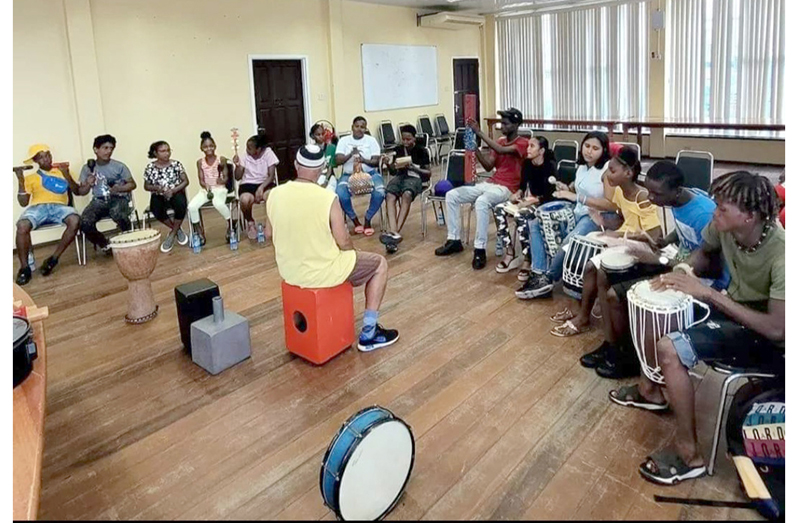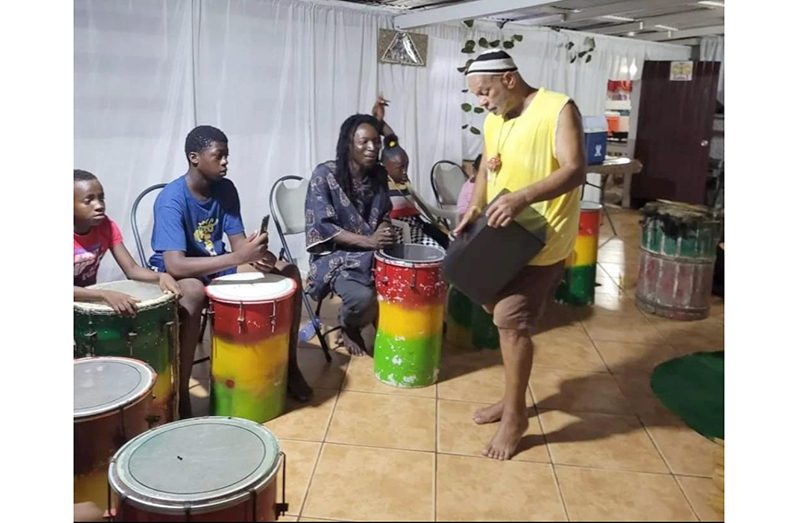THE finale was noisy – musically noisy – as the participants from Joshua House Children Centre ended the upcycling programme on a musical high.
Popular Surinamese musician Leon Limmer (aka Bongo Charlie), conducted the 16 -member group and the laughter and the percussive sounds filled the boardroom of the National Racquet Centre in Woolford Avenue, Georgetown, bringing the three-day pilot upcycling music programme to a happy ending earlier this month.
The ‘Arts & the Environment’ project, of the Rupununi Music & Arts Festival, is an ongoing tailored programme designed to integrate the arts into its educational work, focusing on creating awareness about the negative impact of climate change.
Aimed specifically at children and young people, the programme is flexible and can easily accommodates adults, each in their own way, contributing to Guyana’s Low Carbon Development Strategy (LCDS) through recycling, upcycling and tree planting.

The programme has been in gestation for nearly two years and was launched in Lethem, Region Nine, last May 26, with the help of many supporters from the diplomatic community.
According to Festival Director, Dr. Bob Ramdhanie: “We must engage the younger generation about climate change and there’s no better way to do it than through the arts. We are surrounded by raging fires in Europe, the USA and Australia, tsunamis in Bangladesh, drought across Africa and these are all clear indicators that climate change is about you and me; about our behaviour and our reluctance to change.”
The arts are instruments of social change and have a key role to play in increasing community awareness.
“As individuals, we may feel helpless and think we have no contribution to make but that’s not true. We can recycle and upcycle, we can plant trees and protect the ones we have, we can form community groups and spread awareness of the issues and we can join forces with many other organisations to make our voices heard,” Ramdhani shared.
The Festival launched two pilot programmes in Georgetown in last October and
November. The October programme focused on sharing information about planting trees as part of a long-term economic strategy (cocoa and cotton) in addition to the cultivation of trees for food and fruits. In partnership with the University of Guyana, the festival will be planting 50 fruit trees on the university’s campus.
During November 17-19, the festival collaborated with the Ambassador of the Republic of Suriname to pilot the music upcycling programme, which highlighted how discarded and unwanted materials could be recycled and upcycled, and turned into musical instruments.
The Festival sees the ‘Arts & The Environment’ programme as an integral element of its longer-term plans and will explore more avenues to engage creatives – landscape designers, story tellers, visual and performance artistes, architects, musicians, writers, composers and many others – to work alongside community groups, involving them in creative ways to share their stories and develop meaningful programmes within an action-oriented climate change programme.
The workshops were free, and overall, both pilot programmes were successful and will be ongoing.
“Initially, participants who were introverted and shy expressed their joy and their happiness through their energy and enthusiasm in creating and making music from their souls,” Ramdhani said.





.jpg)








